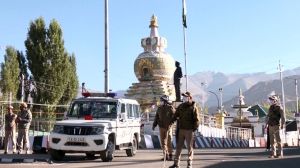Do it yourself: Civic anti-malaria squads get to work
The familiar blue vans drive past a hoarding: Sirf BMC ko mat toko, jo kachra karte hain, unko bhi to roko. (Don’t criticise only BMC, ...

The familiar blue vans drive past a hoarding: Sirf BMC ko mat toko, jo kachra karte hain, unko bhi to roko. (Don’t criticise only BMC, stop those who litter too).
Three supervisors, four labourers and a fogging machine comprise the squad in each van, four of which are out on the streets of Colaba in the morning.
Two supervisors and two labourers team up in pairs to inspect whether each overhead tank is mosquito proof, while the last supervisor and two labourers go about fogging the building and homes with a concentrate of insecticide and diesel.
A resident of Kuvar House at Sassoon Docks says the teams visited last week too, and a month before that. ‘‘Get your pipe repaired. The leakage can be a breeding ground for anopheles mosquito,’’ says an officer firmly.
At the very next building, which houses Hotel Celeste, his words come true. Water leaking from an air conditioner and collecting on the ground had mosquito larvae in it. ‘‘See? People don’t realise,’’ says an angry supervisor, as he picks up larva with a dropper and drops it into a lab bottle.
The vans are carrying out chemical malaria control measures undertaken by BMC’s insecticides branch of the Public Health Department. The officer in charge, Deepak Adsul, says: ‘‘First we try to reduce sources of breeding by removing unused tanks, and making used tanks mosquito proof. Then come the biological measures like introducing larvae-eating fish into stagnant fresh water bodies.
“Chemical control is the third strategy. If nothing works, there is legal help. That’s when we prosecute anyone not taking proper care of water tanks and not making them mosquito proof. We have prosecuted Central Railway, Western Railway, MHADA, CPWD, PWD, and MbPT. A fine between Rs 200 and Rs 1000 can be imposed daily on defaulters, or jail for four months.’’
The BMC has 80 fogging machines and has ordered 17 more. But, by their own admission, fogging alone is not effective enough. Several months ago, they even had trouble acquiring diesel for machines, though officials assure that problem has been solved.
The Surveillance unit of the civic Health Department too undertakes malaria prevention. Its 300-odd investigators visit slums. Blood smears are collected and preventive medicines are administered. Every officer must cover 250 homes a day and the entire locality in a fortnight.



- 01
- 02
- 03
- 04
- 05




























